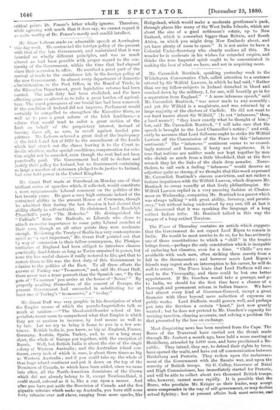Mr. Cavendish Bentinck, speaking yesterday week to the Whitehaven Conservative
Club, called attention to a sentence uttered by Sir Wilfrid Lawson, in which he bad said, "Rather than see my fellow-subjects in Ireland drenched in blood and crushed down by the military, I, for one, will heartily go in for a separation from England." "A more infamous speech," said Mr. Cavendish Bentinck, "was never made to any assembly ; and yet Sir Wilfrid is a magistrate, and was returned by a large majority of the electors of Carlisle. He did not want to use hard names about Sir Wilfrid," [Is not "infamous," then, a hard name ?] "they knew exactly what he thought of him ;" but, said Mr. Cavendish Bentinck, "I will take care that the speech is brought to the Lord Chancellor's notice ;" and evid- ently he assumes that Lord Selborne might to strike Sir Wilfrid Lawson off the Commission of the Peace for this "infamous sentiment." The " infamous " sentiment seems to us exceed- ingly natural and humane, if hasty and impetuous. It is true that nations are neither made nor kept together by men who shrink so much from a little bloodshed, that at the first wrench they let the links of the chain drop asunder. Never- theless, to call such a feeling " infamous " would deserve an adjective quite as strong, if we thought that this word expressed Mr. Cavendish Bentinck's sincere conviction, and not rather a furious impatience with Sir Wilfrid Lawson, which disposes Mr. Bentinck to swear roundly at that lively philanthropist. Sir Wilfrid Lawson replied in a very amusing fashion at Cleator- moor on Wednesday, comparing Mr. Bentinck to a parrot which was always talking "with great ability, fervency, and persist. ency," but without being understood by any one, till at last it was discovered that it was speaking the language of a long extinct Indian tribe. Mr. Bentinck talked in this way the tongue of a long extinct Toryism.


































 Previous page
Previous page